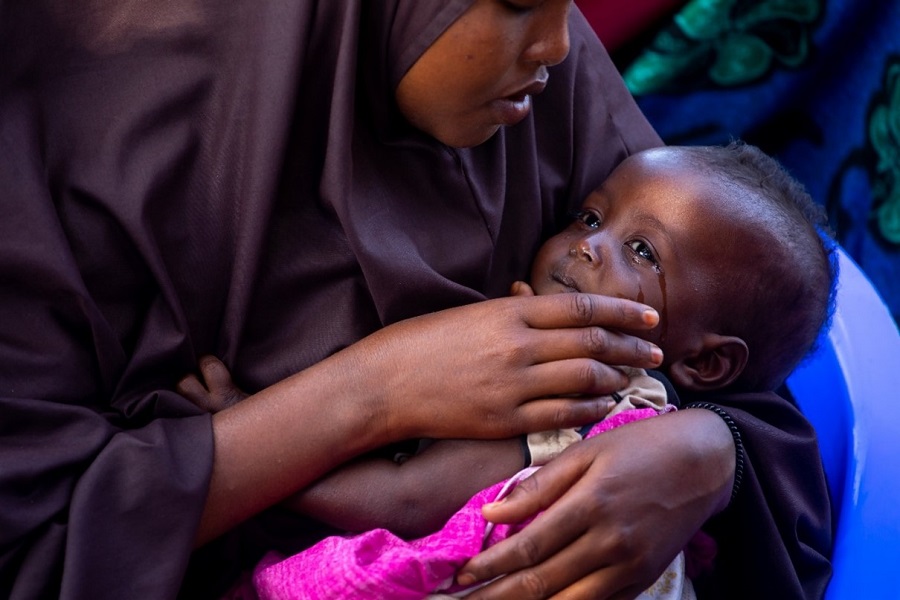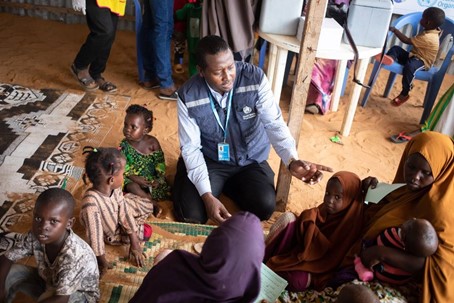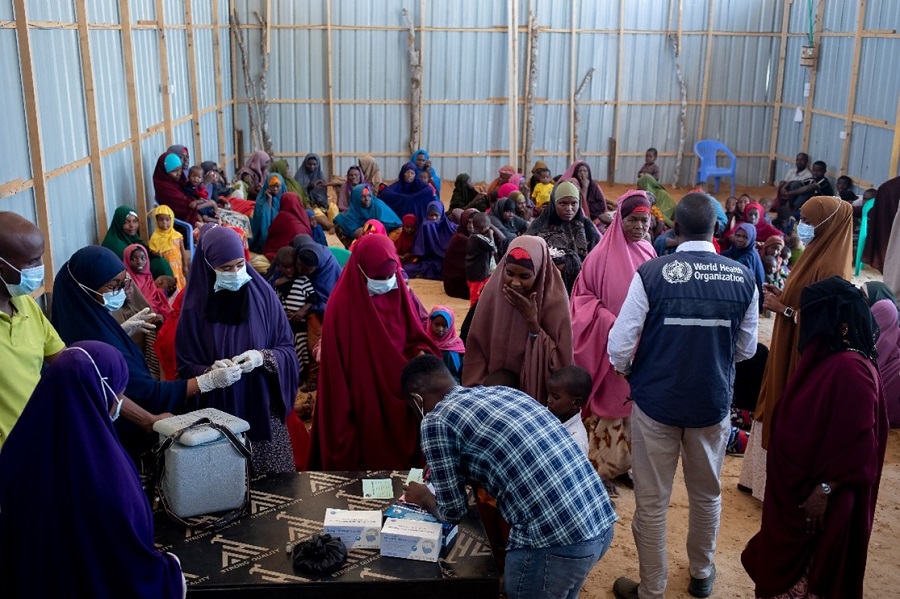 A mother and child after travelling 350 kilometres on foot arrive at Daynile IDP camp in search of food, water and health services. Credit: WHO/Somalia
A mother and child after travelling 350 kilometres on foot arrive at Daynile IDP camp in search of food, water and health services. Credit: WHO/Somalia
WHO integrated health response services help save lives as severe drought triggers population displacements across Somalia
Mogadishu, 9 February 2023 – “After walking for over 350 kilometres with a caravan of about 25 people, including women, children and older people, we have arrived alive and with enough energy to live another day. But there are many we have buried in our villages because of this unending drought,” remarked Ali Abdullahi (55 years) while settling down the handful of belongings that he was able to carry in this life-saving and heart-wrenching week-long journey from the remotest southern village of Galmudug to reach this camp for internally displaced persons (IDPs) in Daynile district of Banadir region.
Every day, an estimated 15 to 20 families are arriving in the suburbs around Mogadishu, including Daynile district. Most of the people arrive on foot and the majority of them have identical stories like Ali Abdullahi to share with the locals and humanitarian teams receiving, registering and treating them at the camp. Daynile, one of the 17 districts within the limits of Banadir Regional Administration, has just over 117 000 households while the camp for IDPs houses over 500 000 people and is growing with every passing day. Owing to decades of conflict and instability, climatic shocks like floods, drought, cyclone and the COVID-19 pandemic, Somalia’s overall and Daynile district’s fragile health system struggles to provide essential health and nutrition services. Now, with IDPs arriving in significant numbers, health facilities in host communities cannot adapt to the increasing needs. Owing to extreme food hunger among the population living in this camp and catastrophic living conditions with no access to safe water and sanitation and hygiene coupled with lack of basic health care for these people who were denied any access to health care for decades before they were displaced to this camp, famine (Integrated food security phase classification 5) has been projected in this district of Mogadishu between April and June 2023.
“We are finding the camp being extended almost daily to accommodate new drought-survivors arriving from various parts of Somalia to find the very basics of life like drinkable water, some food and medical help. These people are coming with almost nothing but with a big burden of diseases and stories of their dead relatives and livestock,” said the WHO-supported health worker, Binte Subah, deputed at the Daynile camp set up for IDPs to provide basic health services to these survivors.
Binte Subah is one of the 70 health workers assigned to provide integrated health services in the camp. To manage the initial influx of displaced persons in the camp, WHO deployed health workers for 4 days a week for a month. But with the continued pouring in of new drought survivors, WHO has extended the mission for another month and will assess the demand of services at the end of next month.
The integrated outreach teams have identified several key health issues affecting people in the IDP settlement and the Daynile community more broadly, including malnutrition, epidemic-prone diseases like acute water diarrhoea and measles, pneumonia, anaemia in pregnant woman, and skin infections due to lack of water intake. These teams have carried out screening to identify and refer children with malnutrition to outpatient therapeutic programmes and at stabilization centres.
“I am thankful to WHO health teams for saving the life of my wife and newborn child by giving them timely medications after we arrived at the camp in Daynile. Soon after giving birth to our child, we had to leave our village because our water wells have dried, our livestock have perished and there are no signs of rain thus we were left with no other option but to migrate in search of food and health services leaving everything behind. In this fragile state, she was walking with us for almost 120 kilometres to reach this camp and both were in a really bad health when we put our foot in the camp,” remarked Abdirahmat with tears in his eyes while receiving the free medicines and supplements for his wife and newborn at the WHO medical centre – set up on the roadside under the shadow of a tree inside the camp.
WHO first to reach security-challenged areas
 WHO teams serving displaced people by setting up a temporary camp on the roadside under a tree in Daynile camp, Mogadishi. Credit: WHO/Somalia
WHO teams serving displaced people by setting up a temporary camp on the roadside under a tree in Daynile camp, Mogadishi. Credit: WHO/Somalia
The World Health Organization Country Office in Somalia undertook a high-level mission led by Mamunur Rahman Malik, WHO Representative and Head of Mission WHO Country Office Somalia, to Daynile district in Mogadishu – the first high-level mission by any UN and international agency to the areas since 2021. The district of Daynile is highly contested and the security risk remains high with 54 incidents, including armed conflict and crime in the last 3 months of 2022. As such providing necessary humanitarian support to new arrivals in the district has been challenging and there is no health post within the IDP camp.
The district is at risk of famine and currently experiencing an influx of internally displaced persons as a result of the ongoing drought – one of the worst that the country has faced. To date, the drought has affected around 7.8 million people across Somalia and over 1 million have been displaced, on top of 2.5 million people who were already internally displaced, in search of food, water and health care.
WHO, since 5 January 2023, started working with the Ministry of Health to deploy integrated outreach teams to provide basic health care services, routine immunization and identify and refer malnourished children and patients for treatment at stabilization centres, reproductive, maternal, neonantal and child health and trauma centres. These teams have been providing health services for 4 days per week for an initial period of one month, while longer term arrangements are being made. In total 70 health care workers, including 43 women, were deployed following integrated primary health care and nutrition training.
 New arrivals at the IDP camp in Daynile District is rising by the day as WHO continues to provide them consultations, treatment, immunization, screening, and referral services in Mogadishu. Credit: WHO/Somalia
New arrivals at the IDP camp in Daynile District is rising by the day as WHO continues to provide them consultations, treatment, immunization, screening, and referral services in Mogadishu. Credit: WHO/Somalia
When the mission arrived, they found outreach teams providing services to mothers and children under the shade of a tree in the middle of the IDP camp. Abdulkadir Mohamed Abdi, WHO’s Surveillance Officer said, “Communities living in this IDP settlement are living in precarious situations and do not have access to basic needs such as the provision of health care services, drinking water, food and proper shelter. We witnessed long queues for people waiting provision of basic primary health care where WHO deployed integrated outreach teams inside the IDP camp. Mothers with their children who were waiting to receive services were very excited since they have never before received such services and there were many zero-dose children receiving the first vaccination for their lifetime.”
 High-level missions from WHO with the Ministry of Health helps to ensure quality of public health interventions and restore confidence of people in government. Credit: WHO/Somalia
High-level missions from WHO with the Ministry of Health helps to ensure quality of public health interventions and restore confidence of people in government. Credit: WHO/Somalia
Community members expressed their appreciation for the services provided by WHO. However, they also shared challenges such as shortages of supplies, including medication to treat urinary tract infections. Outreach teams shared that there was a lack of health education in the community and there was a need for greater community engagement and communication, including household visits to promote the services available.
For additional information, please contact:
Kyle DeFreitas
External Relations Officer
Fouzia Bano
Communications Officer
Note to editors
Please see the links below for additional information on WHO’s drought response across Somalia:
- /somalia/news/somalia-launches-campaign-to-vaccinate-one-million-people-against-cholera.html
- /somalia/news/who-supports-nationwide-integrated-immunization-campaign-in-the-midst-of-drought-261-million-children-vaccinated-against-measles-and-polio.html


